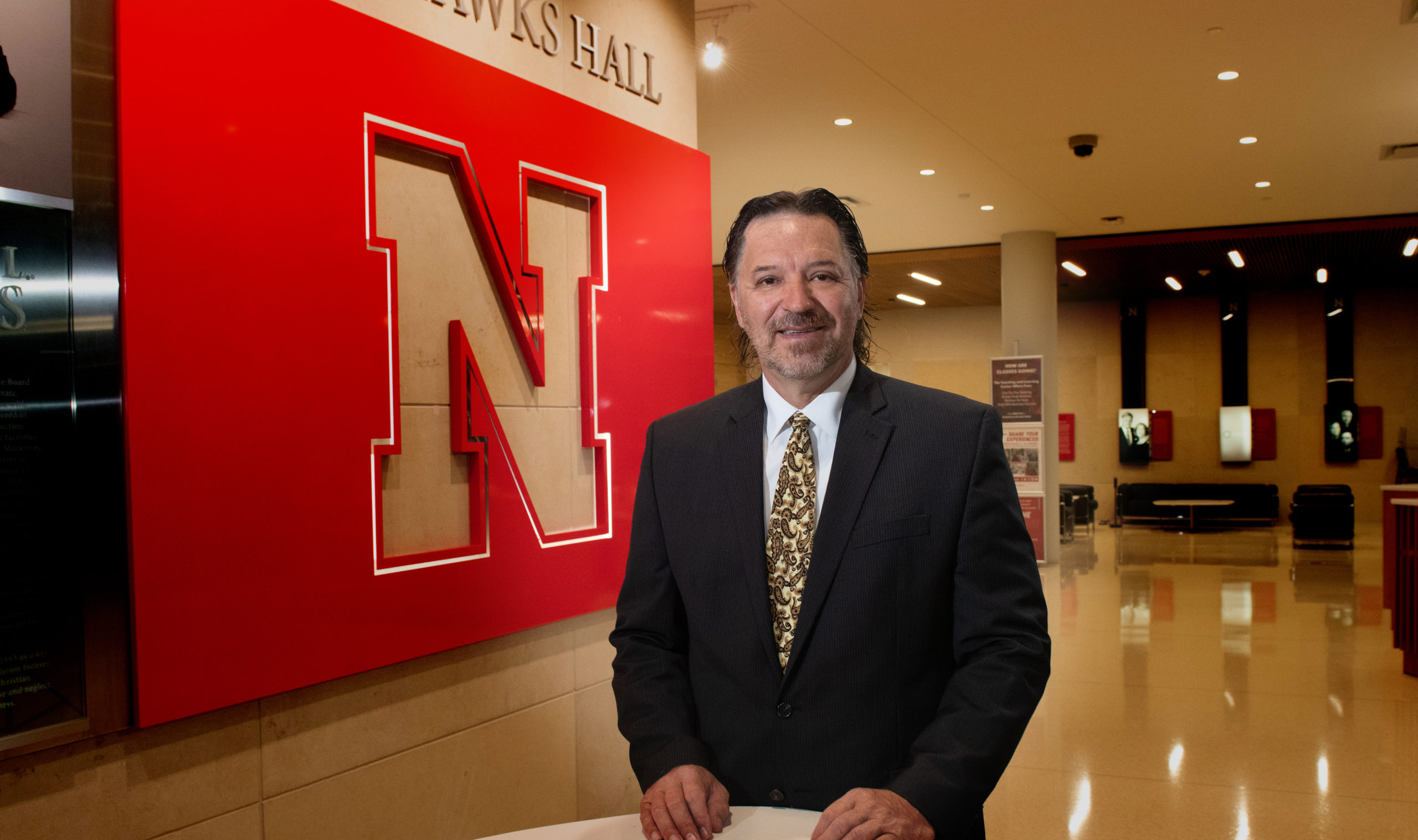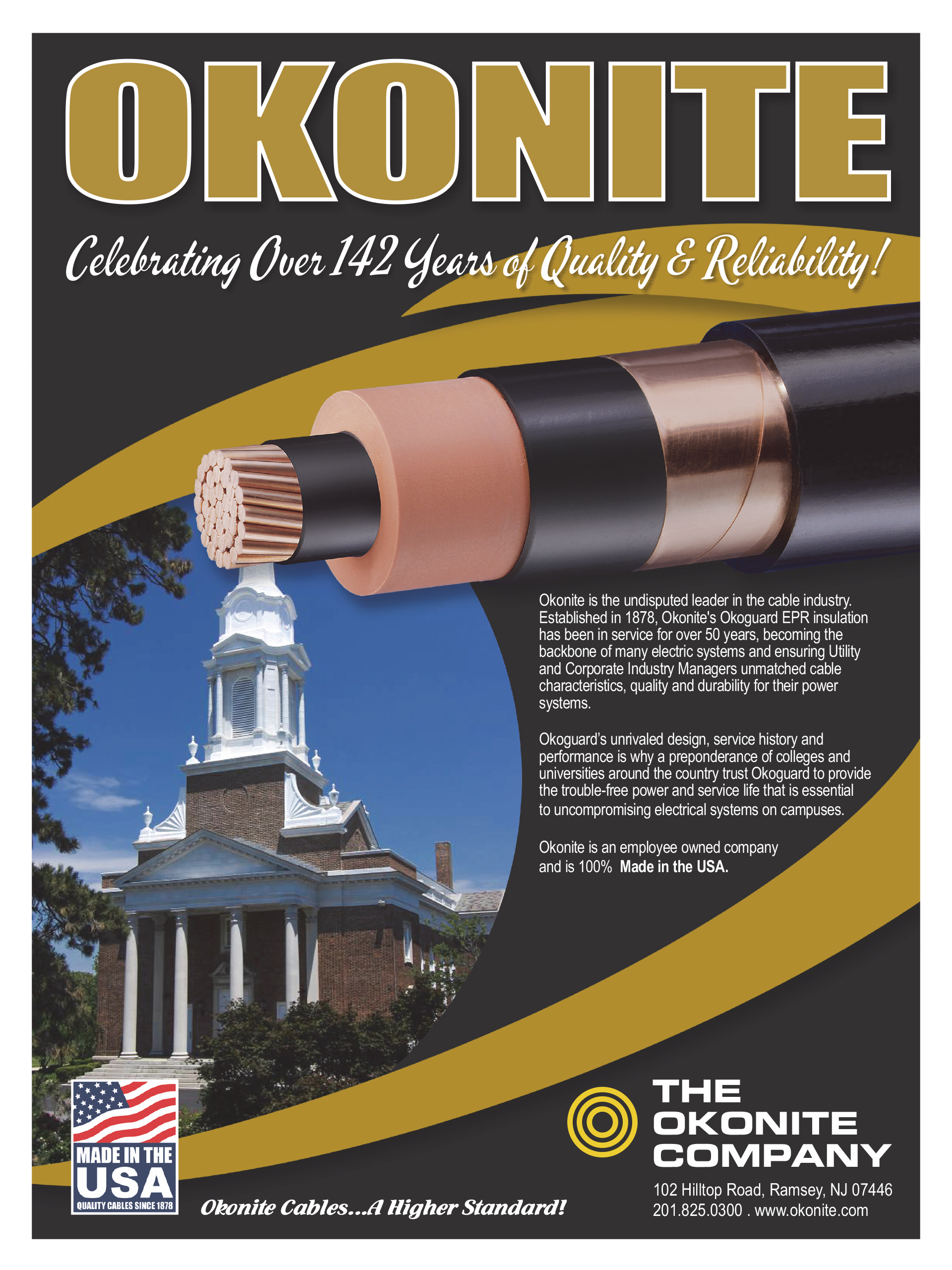Between the coronavirus pandemic, national civil rights demonstrations, and upcoming changes in APPA governance, the newly installed 2020-21 APPA President faces a daunting new world full of challenges for society, higher education, and the association. Jim Jackson, associate vice chancellor (AVC) for university operations at the University of Nebraska Lincoln (UNL), is ready for all of it.
From Entrepreneur to Education
Jackson has handled a variety of professional and personal challenges on his path to becoming the volunteer elected leader of APPA. Originally an entrepreneur who co-owned National Lock & Safe Company and National Door & Lock from 1995 until 2002, he became familiar with the university when he had a contract to do some work there. The higher education environment quickly became attractive in a way that the demands of owning a business could not compete with.
“I had two young kids and didn’t have enough time to spend with them when I was self-employed,” Jackson says. “After 9/11, the university started to enhance its security systems and offered me an opportunity to work here.”
Even though the initial salary was on the low side, he sold the business, accepted the position, and has been with the university ever since. “From there, it’s been kind of a snowball effect,” he says.
Like so many of his APPA colleagues, Jackson found his home and his professional niche in higher education facilities management.
Over the years, Jackson has held positions of greater and greater responsibility at the university. He started as manager of access/fire/security, building systems maintenance, and progressed to assistant director, building systems maintenance; interim director, building systems maintenance; director, building systems maintenance; and finally interim executive director, business and finance, before attaining his current position in January 2020. Being able to spend time with his family more than made up for early financial considerations, and continuing opportunities to learn and apply new skills, grow his sphere of influence, interact with colleagues, and apply the principles of inclusion and diversity that he values so highly have only added to his satisfaction.
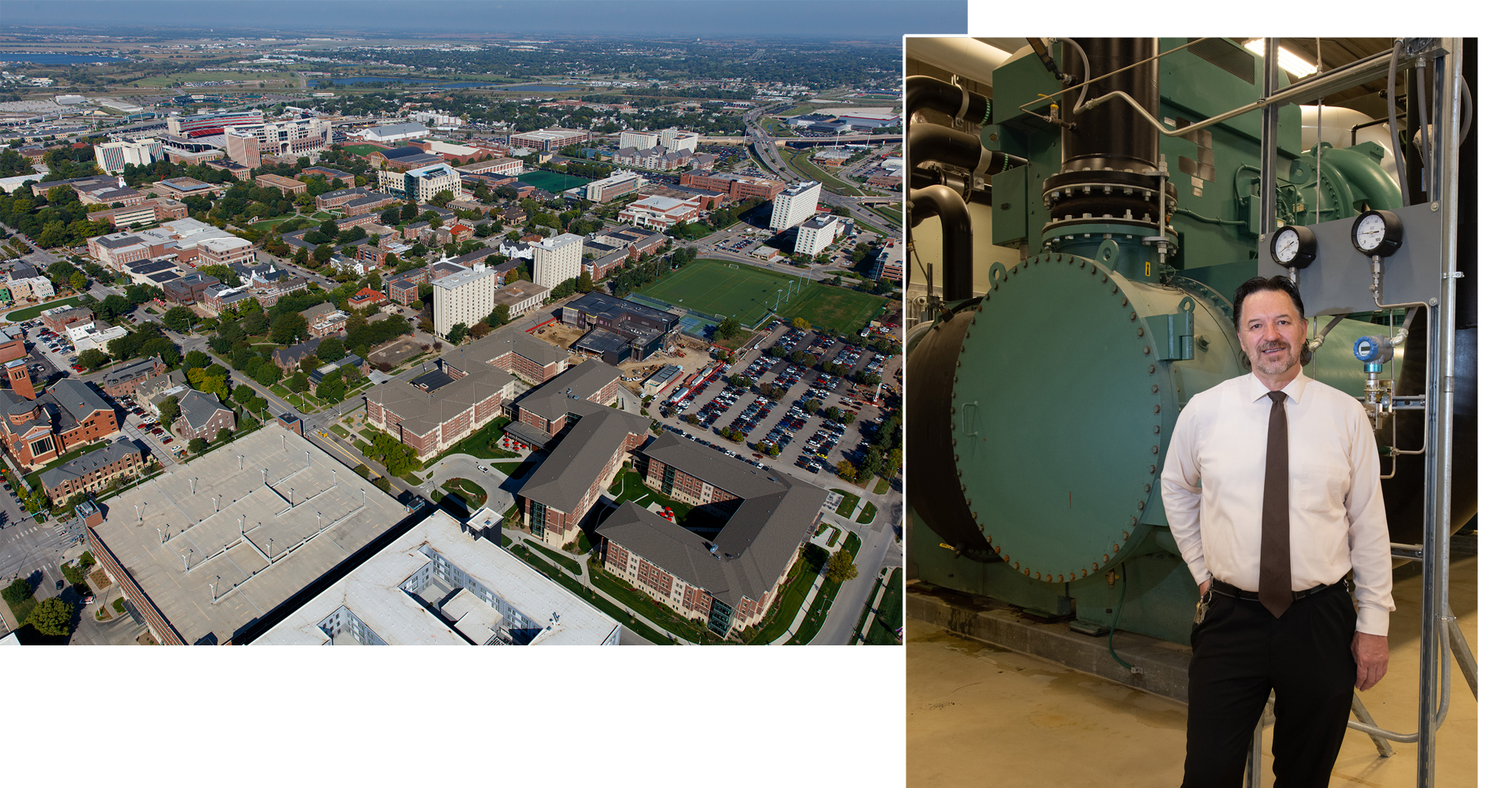
Chartered in 1869, UNL’s main campus sits on more than 600 acres in Lincoln, Nebraska. Jim Jackson joined the university in 2002. (Aerial photo courtesy of UNL University Communications; all other photos are by Gregory Nathan/University Communications.)
In his current AVC role, Jackson is responsible for reviewing and approving capital construction as well as small and large renovation projects, and for overseeing all daily operations for UNL’s two campuses.
“I’ve had great leadership and relations throughout my career at UNL,” he explains in pinpointing factors in his progression upward. I’ve learned about top-down success with empowerment from our leaders and my work with others, and the generosity of mentors. The people who work with me have made my career—your frontline staff, supervisors, and managers can vote you off the island. You have to build trust, lead with consistency, and be somewhat predictable when you lead a large organization.”
Coping with Current Events
The recent coronavirus events have been “somewhat taxing,” Jackson says, given the size of the department he manages, the university as a whole, and his personal life to factor in.
“Early on, we made decisions about which employees were able to work remotely and defined who on our team was essential to continue their work on campus. We never closed or stopped doing what we do,” he says. That’s in part because “we have animals, research, utilities, payroll, bills to pay, and more that could not stop.”
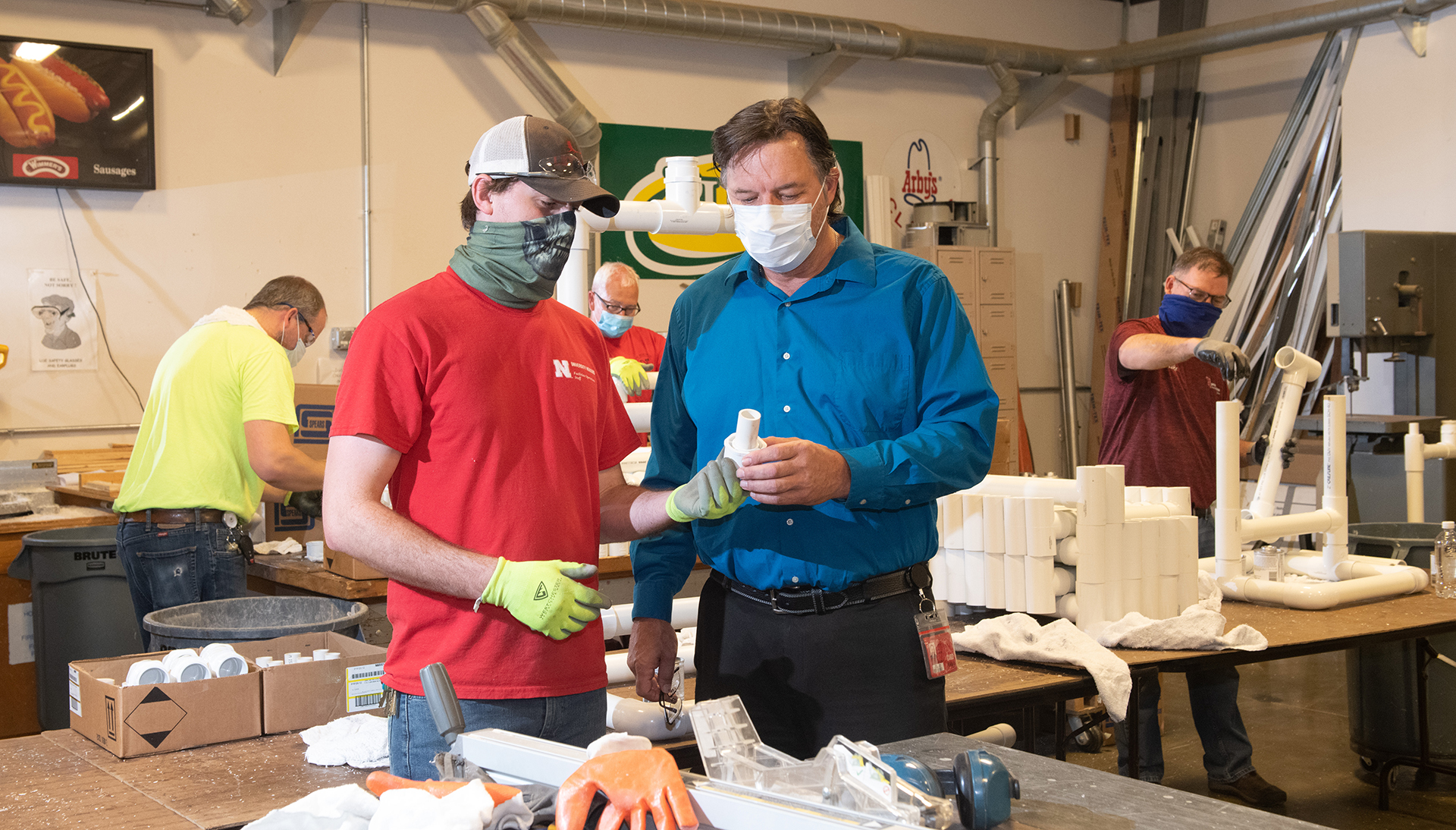
Jackson, right, inspects the innovative hand sanitizer dispensers that UNL’s facilities staff developed at the start of the coronavirus pandemic.
To respond to the pandemic and protect the campus, “We created a central receiving area in our building, and locked down access to other buildings,” Jackson says. He found that the crisis even had an “interesting” and positive effect: His staff took the opportunity to empty buildings and to update classrooms, do deep cleaning, and tackle a variety of other facilities management projects that had been deferred due to a lack of time or other resources when regular day-to-day activities would normally take priority.
As the campus began a slow startup, with staff starting to trickle back on campus in mid-June, the most important goal was “to provide a safe environment of confidence and trust for our students, faculty, and staff,” says Jackson. “We had to stay up to date and educated, as well as flexible and adaptable; the ability to do things differently has been critical. The pandemic tested us in many ways; we were emotional, and sometimes felt tired and down, but we worked toward becoming collaborative, innovative, and resilient. Now we’re starting to feel successful.”
As Jackson’s facilities staff managed pandemic responses and preparations for a fall campus opening, the social justice demonstrations around the country were beginning, but the impact on the physical campus at UNL was minimal. Nevertheless, the issues at the heart of national protests matter to Jackson and his institution.
“Our leadership on campus has always been very supportive of the First Amendment and the right to peaceful protest,” he said. “Although we didn’t have any major protests within our campus, the university is very aware of the impact this issue has on the hearts and emotions of our campus community. UNL is consistently looking for ways to protect and preserve a culture of inclusiveness, openness, and confidence, as well as a safe environment.”
That perspective is important to Jackson in all he does. “I believe in having a very inclusive workforce,” he says. “I personally believe diversity builds knowledge, and inclusiveness builds strength in all we do.”
A Second Home in APPA
For Jackson, APPA membership has not only provided stability in his personal life but has reinforced his commitment to inclusion, collaboration, innovation, and more. He joined the association through the example of Ted Weidner and Jim Hines, who took him to his first APPA conference in 2004. He promptly attended the Supervisor’s Toolkit and says, “I was hooked from then on! APPA has been my foundation.”
Jackson also says that his current supervisor, Vice Chancellor Bill Nunez, along with Chancellor Ronnie Green and UNL’s Executive Leadership Team, “have reinforced my willingness to invest in the personal and professional growth and education of all staff that continue to support the mission to educate students at UNL,” and adds, “That foundation of trust and empowerment among relationships is what inspires me daily to come to work and try to make a difference.”
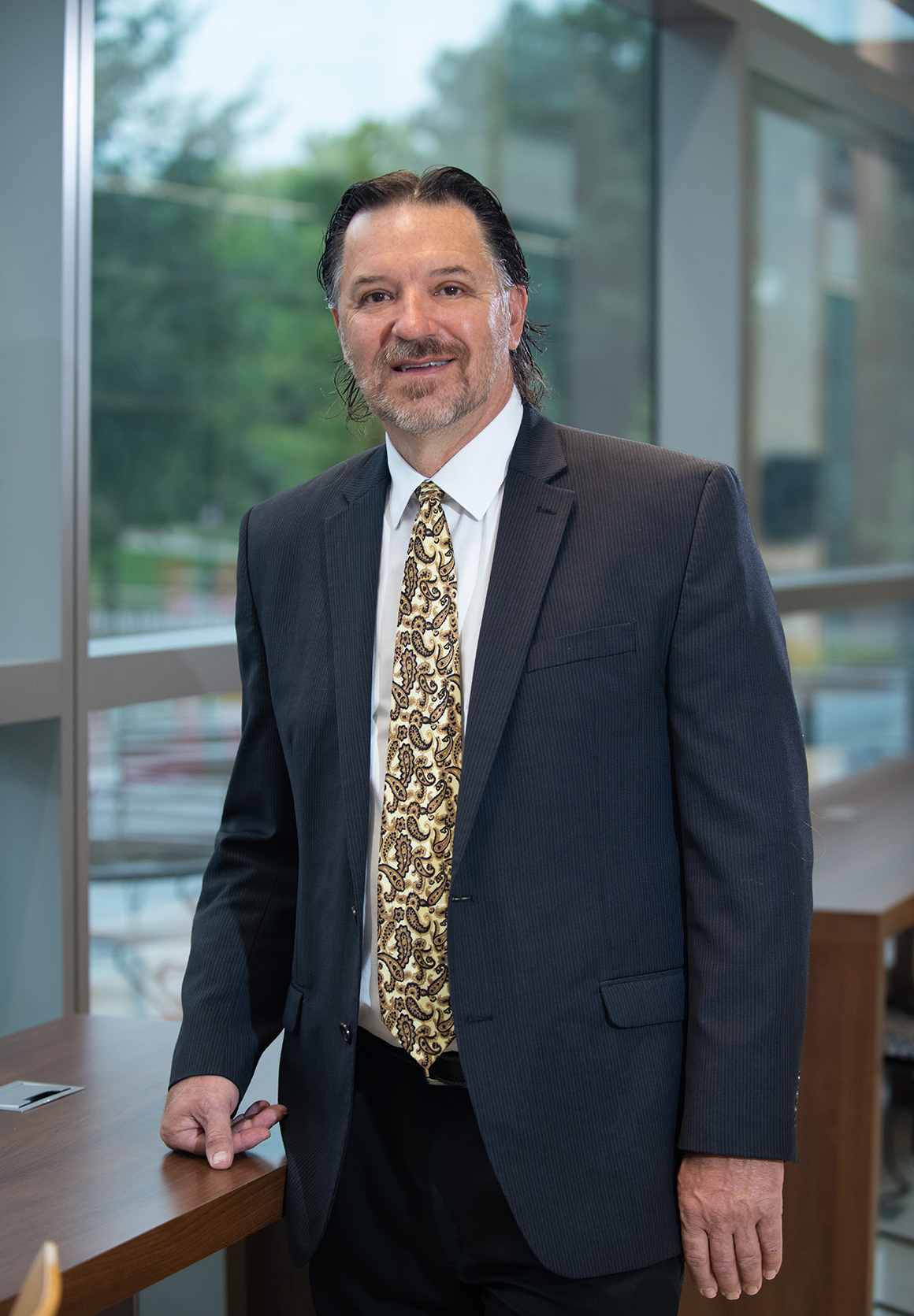
Jim Jackson became UNL’s assistant vice chancellor for university operations in January 2020.
“I worked to change all that to be more based on individuals and on building trust. I’m not a reactive person—I want to be consistent and predictable for my leaders and the people who report to me.”
Jackson has been involved in many APPA activities over the years, including inspiring and assisting in the development of the APPA Graduate Program; being a member of the APPA Faculty; instructing the APPA Graduate Program to guide facility leaders in finding new solutions to old problems; authoring chapters on “Preventive Maintenance Implementation” and “Career Ladders and Position Descriptions” for the second edition of APPA’s Operational Guidelines for Educational Facilities: Maintenance; and serving as 2019-20 President-Elect. Jackson was installed as APPA’s President on July 30 during the virtual Board of Directors meeting.
His approach to leadership and achievements at the university have also been recognized outside APPA. He received the Outstanding Human Resources Partner Award from UNL in 2011, the Kudos Award from the University of Nebraska Board of Regents and president in 2013, and most recently was named Collaborator of the Year by UNL Student Affairs.
Working for the university has opened doors to self-improvement for Jackson, as has his APPA membership.
“I earned my undergraduate degree while working here,” he says. “I also earned my CEFP [Certified Educational Facilities Professional] and other organizational certifications that are important to professional and personal growth. APPA has been an invaluable tool for me, providing knowledge and the ability to plan for the future.”
Jackson sees continuing his professional education and the opportunity to benefit from working in a higher education institution as indispensable. “All institutions should allow their employees to work toward such goals—it’s critical. We are in business to educate; why wouldn’t we provide such resources to those who support the institution—and not limit the opportunity to learn to only students,” he says. “The mission of APPA aligns with the mission of our institutions, and that’s what makes APPA relevant. That is why I couldn’t be more excited to advance APPA’s strategic vision, Preparing for Every Future, by creating a future of continuous learning. Lifelong learning is the key to being prepared to deal with challenges we face now and in an uncertain future. The APPA community is a supportive and sharing environment in which to learn from one another.”
UNL’s N2025 Strategic Plan, guided by the principle that “every person and every interaction matters,” has helped in providing clarity and purpose to Jackson’s approach as a leader, and he has seen the growth in his team both on and off campus as a result of buy-in to this philosophy. When he moved into facilities management, “everything was pre-scripted,” so there was very little flexibility in how the department managed and responded to its responsibilities.
“I worked to change all that to be more based on individuals and on building trust,” says Jackson. “I’m not a reactive person—I want to be consistent and predictable for my leaders and the people who report to me.”
Jackson doesn’t take credit for his upward progress in APPA or for his university, nor for his desire to serve and to seek increasingly important roles. He may be driven to lead, but he doesn’t see his role as a solitary effort.
“It hasn’t necessarily been me,” he says. “I go back to the leadership who gave me opportunities—I just pass it on. People have been pulling me along, sometimes pushing me along, and sometimes having to slow me down. If you want to succeed, there’s always someone willing to help you make it happen.”
Being active in APPA, as well as deeply involved in his university work, has had both a personal and professional impact for Jackson beyond anything most of his colleagues could imagine. That was especially true when his daughter, Jessica Lynn, committed suicide in 2014 after serving a tour of duty in Afghanistan.
“My family, APPA, and my institution were critical in helping me work through the unexpected loss. The outreach, understanding, and support provided was unmatched,” he says. “The loss of a loved one in this way is something you don’t get over. You just work hard every day to get through. There are so many people even today who continue to support and encourage me, as this is truly one of the greatest challenges my family and I have experienced and will continue to battle through. And I want our members to know that I, in turn, am open and available to help others through life’s personal challenges.”
Optimism for the Future
Over the first half of 2020, the APPA Governance Task Force worked on developing an implementation plan for restructuring the association in accordance with the Board of Directors’ adopted recommendations from the APPA Fellows Governance Review Report. Jackson became President following the Board’s approval of the implementation plan and will serve the critical leadership role of overseeing transformational change for APPA’s Board, committees, and bylaws. The main focus during Jackson’s presidency will be to execute these changes in an effective manner that will ensure smooth continuity and successful outcomes.
“I go back to the fact that I am very humbled to be APPA’s President and honored to do so,” Jackson says of this challenge. “The pandemic and related fiscal challenges mean that it is vital for us to stay relevant in a new environment, but I’m not nervous about it.”
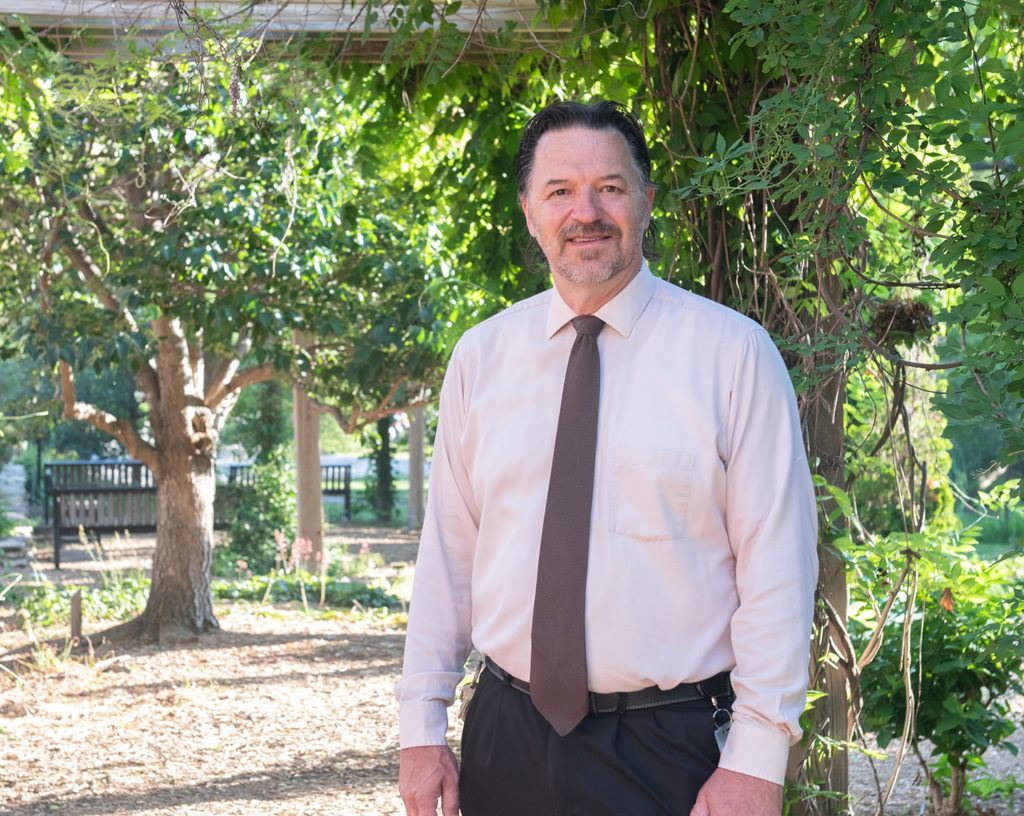
Jackson and the Maxwell Arboretum on UNL’s East Campus.
Part of the attitude goes back to the APPA community, according to Jackson. “I have so much support from so many individuals—the Immediate Past President and President-Elect, the APPA Board, Vice Presidents, APPA regional leaders, Executive Vice President Lander Medlin and the APPA staff, my institution for allowing me the time to serve, and a string of former presidents with whom I have had relationships for many years,” he says. “It’s an awesome team who will be working with me on implementing these strategies. I’m excited to be in this role and to be advancing APPA’s agenda for change at this critical juncture. I’m looking forward to being a productive servant leader for the board, the staff, and the membership.”
Jackson sees the success of that new governance as relying in part on APPA’s regional engagement. “In the past year, I’ve been spending time with the regions, and it’s been enlightening to see how hard they work and how passionate they are about providing opportunities to our members,” he says. He shares the regional passion for the facilities management profession and for making APPA as responsive as possible to what members and their institutions need to succeed.
For Jackson, one of the most important features of APPA is the association’s role in helping its members to be responsive, relevant, and ready. “There are problems that can be solved across the country and international borders,” he says. “APPA pulls everybody together to create a big team. We should all try to take advantage of what APPA has to offer. It helps build communities and makes us better people.”
Ready for Whatever Might Arise
In Jackson’s eyes, APPA’s new governance, strong regional support and engagement, and extensive range of programs and services mean that the association under his leadership—and beyond—is “a resilient, relevant organization that’s been planning for every future and is already prepared to cope with whatever it might face. The strategic planning framework and governance changes align us for success and for being the leader in educational facilities management.”
As the 2020-21 President, Jackson brings with him a deep sense of APPA’s value and strength. “APPA is unique in facilities management—in any industry—and offers us an opportunity to learn and to grow,” he says. “Not everything we learn will be practical, but we can always learn something new. This goes back to the philosophy of ‘diversity equals knowledge’ and ‘inclusiveness equals strength,’ which is at the heart of APPA’s mission.”
Ruth Thaler-Carter (www.writerruth.com) is a freelance writer/editor, based in St. Louis, MO, who has been contributing to APPA publications since 1988.
